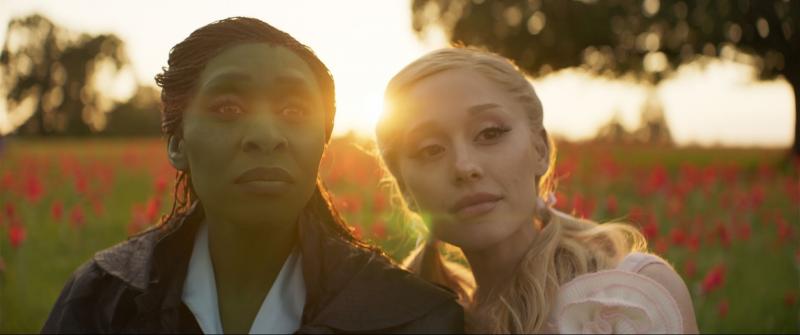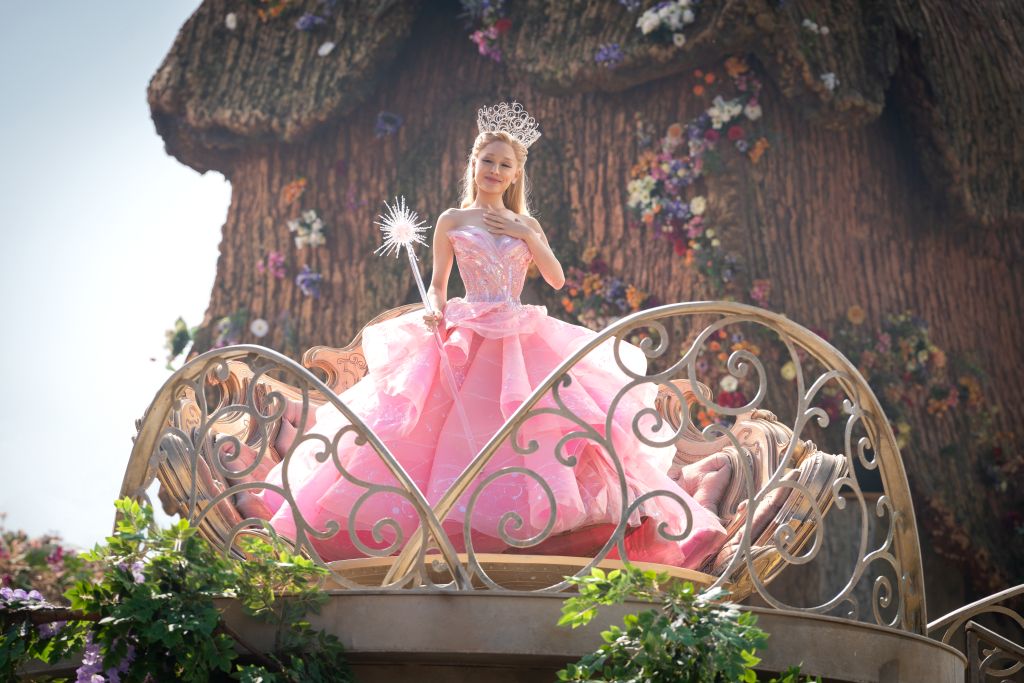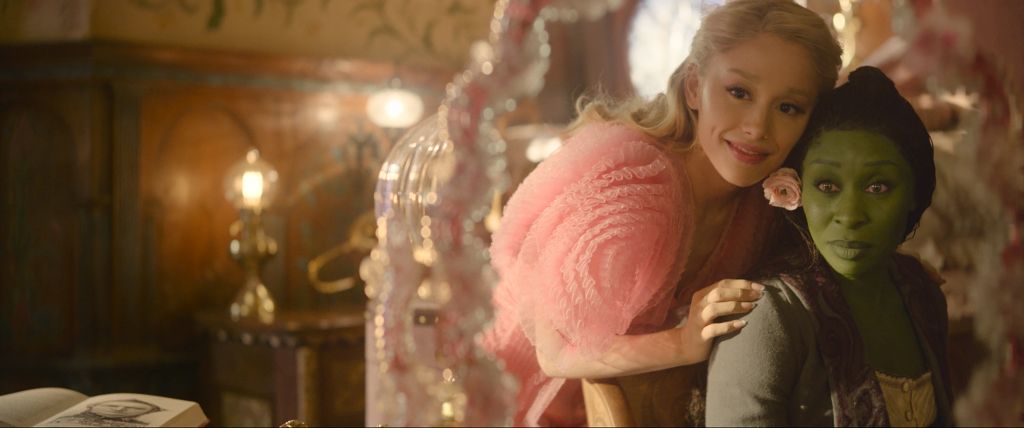Wicked review - overly busy if beautifully sung cliffhanger | reviews, news & interviews
Wicked review - overly busy if beautifully sung cliffhanger
Wicked review - overly busy if beautifully sung cliffhanger
Musical theatre behemoth becomes an outsized film - and this is just part one

"No one mourns the wicked," we're told during the immediately arresting beginning to Wicked, which concludes two hours 40 minutes later with the words, "to be continued" flashed up on the screen. Will filmgoers mourn that they have to wait an entire year to see the second part of this supercharged screen adaptation of the stage musical blockbuster that London and New York audiences can currently absorb in a single sitting?
Wicked does nothing by halves except, it would seem, make two movies out of one theatrical entertainment. On view just now is the first half of the material, ending with the emancipation that accompanies Elphaba Thropp's discovery that she can fly, and thereby make a positive out of the misfortune that has been her lot ever since she happened to be born green. That awareness is signaled by the show's enduring power balled, "Defying Gravity," here belted through the clouds and beyond by Cynthia Erivo, who hails from the very world of barnstorming theatrical vocals - in shows like The Color Purple, preeminently - to which Wicked owes its popularity.
 The very word "popular" earlier cues the first-act signature song for the film's other star, Ariana Grande (billed in the film's credits by her full name Ariana Grande-Butera). Delivered with hair-tossing brio by Grande's Galinda (later Glinda) Upland, as a favour to her new roommate, Elphaba, at the Ozian institution known as Shiz, the number accommodates perhaps more interaction with props than this film's director Jon M Chu's busy camera can contain; in one set piece after another, Christopher Scott's choreography favours excess over elegance.
The very word "popular" earlier cues the first-act signature song for the film's other star, Ariana Grande (billed in the film's credits by her full name Ariana Grande-Butera). Delivered with hair-tossing brio by Grande's Galinda (later Glinda) Upland, as a favour to her new roommate, Elphaba, at the Ozian institution known as Shiz, the number accommodates perhaps more interaction with props than this film's director Jon M Chu's busy camera can contain; in one set piece after another, Christopher Scott's choreography favours excess over elegance.
But Grande proves there as elsewhere that she is a natural inheritor to her role's brilliant originator, Kristin Chenoweth. More than any stage Glinda I have encountered since I first saw Chenoweth and her Tony-winning co-star, Idina Menzel, in the show on Christmas night, 2003, Grande makes something immediately winning out of her character's narcissism: put another way, you sense at once the goodness to Glinda that will crack wide open by the show's finale, and its climactic duet, "For Good," that mere cineastes have to wait a year to hear. (Chenoweth and Menzel, incidentally, are given sweet screen cameos.) Musical theatre nerds, amongst whom I freely count myself, may have started a silent countdown to the celluloid resolution that lies in wait, even as part of me is left pondering the implicit hubris of a movie on this scale: will the mass audience care? Then again, think of the money that could have been saved if, say, all the Rocky movies had been shot at once!
Is Wicked itself the salvation Hollywood has been hoping for when it comes to making blockbuster theatrical properties sing once again onscreen? In some ways, it's astonishing: you never question for a moment the creatives' fierce commitment to honoring the vision forged onstage by composer Stephen Schwartz and book writer Winnie Holzman, who shares a screenwriting credit with Dana Fox. They, in turn, were adapting Gregory Maguire's 1995 novel giving us the back story to The Wizard of Oz's unfairly maligned - we now realise - Wicked Witch of the West.
 Songs are stretched well beyond their equivalent stage time - interrupted with bits of business or changes of locale or often both. We learn right at the start of the horror Elphaba's skin colour has generated since birth. London stage regular Andy Nyman (due imminently in the revival of The Producers) plays her disapproving father, the family's attention instead given over to Elphaba's younger sister, Nessarose (Marissa Bode), whose arrival at Shiz causes her kindly older sister to come along to supervise. A wheelchair user, Nessarose, too, leads a singular existence that renders the siblings soulmates. The pair are joint outsiders to a world that values that most wretched of states of being, normal: that word has itself become a stage musical trope, powering the likes of Next to Normal, Mean Girls, and countless other titles of late that deliberately question the status quo.
Songs are stretched well beyond their equivalent stage time - interrupted with bits of business or changes of locale or often both. We learn right at the start of the horror Elphaba's skin colour has generated since birth. London stage regular Andy Nyman (due imminently in the revival of The Producers) plays her disapproving father, the family's attention instead given over to Elphaba's younger sister, Nessarose (Marissa Bode), whose arrival at Shiz causes her kindly older sister to come along to supervise. A wheelchair user, Nessarose, too, leads a singular existence that renders the siblings soulmates. The pair are joint outsiders to a world that values that most wretched of states of being, normal: that word has itself become a stage musical trope, powering the likes of Next to Normal, Mean Girls, and countless other titles of late that deliberately question the status quo.
More so than onstage, one feels a tension inherent in the film's cotton candy sense of fun - the glossy, devil-may-care showmanship personified by a slick-haired Jonathan Bailey's preening Fiyero, whose "Dancing through Life" asserts a carefree way of being at odds with Erivo's singleminded Elphaba, who carries consternation with her. Are we watching a frolicsome CGI-fueled fantasy designed to a visually overwhelming fare-thee-well, or a dark political parable - or both? The film comes rather uneasily to occupy both camps in keeping with Michelle Yeoh's Madame Morrible, who morphs from seemingly benign headmistress of Shiz to someone who could as well be a Trump cabinet appointee.
I was most intrigued by a political resonance the film has acquired following the US election that extends well beyond the lip service paid to totalitarian misrule in the director Joe Mantello's stage version. You really do mourn here for Peter Dinklage's beautifully spoken Dr Dillamond, the history professor (and, um, goat), whom we see being silenced as part of Shiz University's determination to own the libs.
And Elphaba sweeps Glinda along (by rather spectacular train, mind you) to meet Jeff Goldblum's shakily sung Wizard as if ready to shatter the brick ceiling about which MAGAts have been gloating since 5 November. "I don't cause a commotion, I am one," Elphaba has said previously to Fiyero, who finds himself torn between two hypothetical lovers even if you sense his primary affection is for himself. But that was then for our gatheringly airborne heroine, and time has passed.
Tired of being demonised, Elphaba by film's end won't look on as the world she values is destroyed. "I'm not afraid," she announces, an embryonic gladiator in her own right. Will her fearlessness seize the day? I've seen the entirety of the stage show, but my lips are sealed. Let's revisit the question in 12 months.
- More film reviews on theartsdesk
The future of Arts Journalism
You can stop theartsdesk.com closing!
We urgently need financing to survive. Our fundraising drive has thus far raised £49,000 but we need to reach £100,000 or we will be forced to close. Please contribute here: https://gofund.me/c3f6033d
And if you can forward this information to anyone who might assist, we’d be grateful.

Subscribe to theartsdesk.com
Thank you for continuing to read our work on theartsdesk.com. For unlimited access to every article in its entirety, including our archive of more than 15,000 pieces, we're asking for £5 per month or £40 per year. We feel it's a very good deal, and hope you do too.
To take a subscription now simply click here.
And if you're looking for that extra gift for a friend or family member, why not treat them to a theartsdesk.com gift subscription?

Add comment